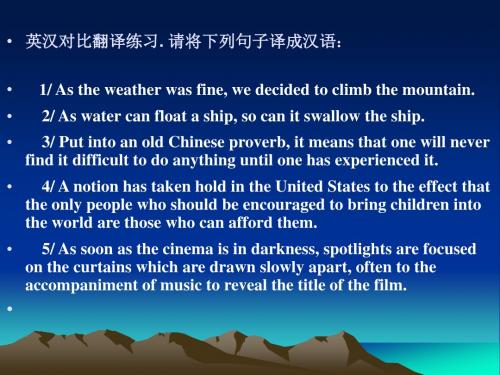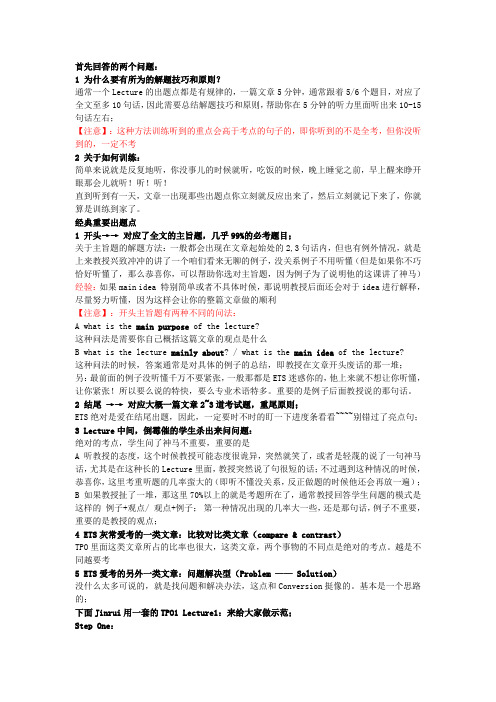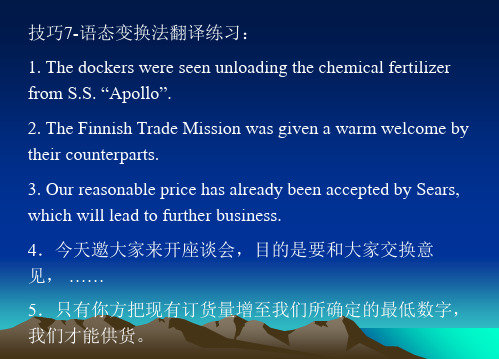Lecture 8 conversion
lecture 8 翻译技巧七 语态变换法

1). It’s believed that her plans for a movie career had all been merely a pipe dream. 有人说她那些当明星的计划全都是些非非遐想罢了。
英语中以it 做形式主语,以被动语态作谓语,其后跟一个由that引导的主语从句的结构很多。这种结 构在译成汉语时,除把it一律省略外,通常有两种处理方法: 1.在被动语态前加“人们”、“有人”、“我们”、“大家”等词 2.用“据……”等短语译出
2). It is estimated that Americans spend up to five years of their lives in that tedious, stressful but unavoidable process known as waiting. 据估计,美国人一生中, 在乏味而令人厌烦, 却又躲避 不掉的等待上所耗费的时间,竟达五年之多。
到目前为止,二氧化硫一直被看作是这些污染物中
最严重的一种。
3) All around, the hills were black with oil, and some
were hidden by gas and drifting oil spray. 四周,由于蒙上了一层油,山峦是黑色的,有的山 峦则被天然气和在风中飘洒的喷油遮挡住了。 4) The thrust force of an airplane is produced by the propeller. 飞机的推力由螺旋桨所产生。
近四十岁时,由于事业上的挫折,他几乎为失意所 毁。
8) The laws of motion will be discussed in the next articles.
lecture翻译技巧一词义选择

• 译:可能影响投资开支的因素并不止这些。 • 析:do not stop here 由“不停留在这里” 转译为“并不止这些”。
Case 2
• Whether you like it or not, globalization is here to stay. We are not going to reverse the trend.
1. 根据词在句中的词类来选择和确定词义 选择某个词的词义,首先要判明这个词在原句中应属哪 一种词类,然后再进一步确定其词义。例如: Like charges repel. Unlike charges attract. 同极相斥。 异极相吸。
但在下面例句中,like又分属其他几个不同词类: 1) He likes mathematics more than physics. 他喜欢数学甚于喜欢物理学。(动词) 2) In the sunbeam passing through the window there are fine grains of dust shining like gold. 在射入窗内的阳光里,细微的尘埃象金子一般在闪闪发光。
• 译:不管你对它的态度如何,经济全球化已成为 我们生活的一部分,这个趋势不可逆转。 • 析:若把它死译为“呆在这里”,不通顺。但引 申为“已成为我们生活的一部分”,把原文的信 息充分地传达出来,且易于读者理解。
Case 3
• Our products, if maintained properly and regularly, can at least see twenty years’ service.
[1][2][3][4][5]
再如“take (off)这一动词:
1) To take off her boots or to put them on was an agony to her, but it had been an agony for years.
增译法

根据意义或修辞上的需要增加:
动词 形容词 副词 名词 表示名词复数的词 表示时态的词 语气助词、量词、概括词 承上启下的词
1. Addition of Verbs增译动词
In the evening, after the banquets, the concerts and the table tennis exhibitions, he would work on the drafting of the final communiqué . 晚上在参加了宴会、出席了音乐会、观看了乒乓 球表演之后,他还得起草最后公报。 They talked for almost eight hours, through dinner and well into the night. 他们交谈了差不多八个小时,中间吃了一顿饭, 一直谈到深夜。
2. Addition of adjectives增译形容词
With what enthusiasm the Chinese people are building socialism! 中国人民正在以多么高的热情建设社会主义啊! The great scientist was born in New England. 这位伟大的科学家出生在美国东北部的新英格兰。 These were the words that were to make the world blossom for me, “like Aaron’s rod, with flowers”.
5. He turned a chair around and straddled it, resting his chin on the back. 他把椅子转过来,叉开腿坐在上面,下巴搁在椅 背上。 他把椅子转过来,叉开腿一屁股坐在上面,下巴 搁在椅背上。(增译副词) 6.He ate and drank, for he was exhausted. 他吃喝了点,因为他疲惫不堪了。 他疲惫不堪了,就吃了点东西,喝了点水(酒)。 (增译名词)
Conversion转译法学习课件

Different expression in English and Chinese For example: verbs He admires the President’s stated decision to fight for the job. 他对总统声明为保住其职位而决心奋斗表示钦佩。
examples
Formality has always characterized their relationship. 他们之间的关系,有一个特点,就是以礼相待。 The pallor of her face indicated clearly how she was feeling at the moment. 她苍白的脸色清楚地表明了她那时的情绪。 The President had prepared meticulously for his journey. 总统为这次出访作了十分周密的准备。
Converted into nouns
Verbs derived from nouns Verb in the sentence of passive voice: can be translated into the structure such as “受(遭)到……+名词”、“予(加)以+名词” examples
Nouns---verbs
Nouns with –er: teacher, thinker Not refer to their professions or careers but have the meaning of action. examples
examples
I am afraid I can’t teach you swimming. I think my little brother is a better teacher than I . 我未必会教你游泳。我想我的小弟弟比我教得好。 Talking with his son, the old man was the forgiver of the young man’s past wrong doings. 在和儿子谈话时,老人宽恕了年青人过去所干的坏事。 Although he was always the “background” briefer on foreign policy issues, he could never be identified as anything other than “a White House official” or “a high Administration source.” 虽然外交问题的“背景情况”总是由他介绍,但他仍只能称为是“一位白宫官员”或“一位政府高级人士”。
托福听力之-lecture技巧

首先回答的两个问题:1 为什么要有所为的解题技巧和原则?通常一个Lecture的出题点都是有规律的,一篇文章5分钟,通常跟着5/6个题目,对应了全文至多10句话,因此需要总结解题技巧和原则,帮助你在5分钟的听力里面听出来10-15句话左右;【注意】:这种方法训练听到的重点会高于考点的句子的,即你听到的不是全考,但你没听到的,一定不考2 关于如何训练:简单来说就是反复地听,你没事儿的时候就听,吃饭的时候,晚上睡觉之前,早上醒来睁开眼那会儿就听!听!听!直到听到有一天,文章一出现那些出题点你立刻就反应出来了,然后立刻就记下来了,你就算是训练到家了。
经典重要出题点1 开头→→ 对应了全文的主旨题,几乎99%的必考题目;关于主旨题的解题方法:一般都会出现在文章起始处的2,3句话内,但也有例外情况,就是上来教授兴致冲冲的讲了一个咱们看来无聊的例子,没关系例子不用听懂(但是如果你不巧恰好听懂了,那么恭喜你,可以帮助你选对主旨题,因为例子为了说明他的这课讲了神马)经验:如果main idea 特别简单或者不具体时候,那说明教授后面还会对于idea进行解释,尽量努力听懂,因为这样会让你的整篇文章做的顺利【注意】:开头主旨题有两种不同的问法:A what is the main purpose of the lecture?这种问法是需要你自己概括这篇文章的观点是什么B what is the lecture mainly about? / what is the main idea of the lecture?这种问法的时候,答案通常是对具体的例子的总结,即教授在文章开头废话的那一堆;另:最前面的例子没听懂千万不要紧张,一般那都是ETS迷惑你的,他上来就不想让你听懂,让你紧张!所以要么说的特快,要么专业术语特多。
重要的是例子后面教授说的那句话。
2 结尾→→ 对应大概一篇文章2~3道考试题,重尾原则;ETS绝对是爱在结尾出题,因此,一定要时不时的盯一下进度条看看~~~~别错过了亮点句;3 Lecture中间,倒霉催的学生杀出来问问题:绝对的考点,学生问了神马不重要,重要的是A 听教授的态度,这个时候教授可能态度很诡异,突然就笑了,或者是轻蔑的说了一句神马话,尤其是在这种长的Lecture里面,教授突然说了句很短的话;不过遇到这种情况的时候,恭喜你,这里考重听题的几率蛮大的(即听不懂没关系,反正做题的时候他还会再放一遍);B 如果教授扯了一堆,那这里70%以上的就是考题所在了,通常教授回答学生问题的模式是这样的例子+观点/ 观点+例子;第一种情况出现的几率大一些,还是那句话,例子不重要,重要的是教授的观点;4 ETS灰常爱考的一类文章:比较对比类文章(compare & contrast)TPO里面这类文章所占的比率也很大,这类文章,两个事物的不同点是绝对的考点。
Lecture_7_Conversion解析

Words whose parts of speech tend to be converted in translation
gerunds (V-ing) derivatives V-er participles (V-ed/ V-ing) → adj. zero-suffix derivatives (Noun with verbal property)
Definition
Conversion, one of the commonly adopted translation techniques, means the change of parts of speech in translation. Owing to the syntactical differences between English and Chinese, it is usually impossible for a translator to keep to the original part of speech in the process of translation.
Can you identify the predicate verbs and nouns derived from verbs in these sentences?
(1) Ambassador Wilson, a shaggy-haired, camera-friendly presence, has been meeting the press on a regular basis. (2) In Kenya, she received the news of her father's death and her own accession to the throne. (3) What I despised him was his drinking, gambling and cursing.
Lecture 3 Conversion 翻译词类转换

• The problem above is of great importance.
•I am afraid I can’t teach you swimming, I think my little brother is a better teacher than I . • 我未必会教你游泳。我想我的小弟弟 比我教得好。 • He is a good listener and they like to talk with him. • 他能倾听别人的意见,因此他们喜欢 和他聊。
• Your work is characterized by the lack of attention to detail. • 你工作的特点(缺点)是不注意细节。 • Secondly, I was better shaped. • 其次,我的身材也好些。 • In Europe, the color white symbolizes purity. • 在欧洲,白色是纯洁的象征。
Adv. in English——Verb in Chinese
• 英语中的副词(尤其是作表语表语时)常转译为 汉语动词:
• I must be off now. • 我必须得走了。 • The performance is on. • 表演正在进行。
• Who invited you out for the evening yesterday? • 昨晚谁邀请你出去的? • What film will be on this evening? • 今晚放映什么影片? • He finally got his report down to three pages. • 他最后将报告压缩到了三页。
Unit Eight Conversion of Voices

In-Class Drill
• Translate the following sentences into English. • 1.那时和谈正在巴黎进行。 • 2.烈火立刻把他包围了。
4.为了加强上下文的连贯性,而要将原汉语 主动式变为被动式。
①她出现在台上,观众给予热烈鼓掌。 译文:She appeared on the stage and was warmly applauded by the audience. ②口试时,问了十个问题,她全都答对了。 译文:She was asked ten questions in the oral exam and answered every one of them correctly.
Unit Eight
语态转化译法 (Reversing Voice)
语态变换译法是指在翻译过程中把原文中的 被动语态转换成译文中的主动语态,或把原文的 主动语态转换成译文中的被动语态。 一般而言,无论是书面语中还是口语中, 英语比汉语用更多的被动语态。在汉译英过程中, 一些汉语中的主动语态句式可以根据具体情况而 变为被动语态。
3. The arms race must be stopped.
4. This article needs further polishing/to be further polished.
英语中使用被动语态的情况有:
①着重被动的动作;
②突出动作承受者(人或事)的重要性; ③不知道或无须说出施动者; ④便利上下文的连贯、衔接。
1.本身就带有被动标记如“被”、“由”、 “遭”、“给”、“挨”、“叫”、“让” 等的汉语被动句式译成英文时一般也应保 持被动式。
①海外华侨现在不再被人轻视了。 译文:Overseas Chinese are no longer looked down upon. ②他被选为学生会主席。 译文:He was elected Chairman of the Students’ Union.
Lecture 8-Conversion

• This experiment was a success. (n-a) • 这次实验室成功的。 • I have the honour to inform you that your request is granted. • 我荣幸地通知你,你的要求以得到批准。( n-adv) • There is a big increase in demand for all kinds of consumer goods in every part of our country.(aadv) • 目前,我国各地对各种消费品的需求量已大大增 加。
• V. converted into prep. • 我们不顾一切困难、挫折,坚持战斗。 • We kept on fighting in spite of all difficulties and setbacks.
E-C
• English N. converted into Chinese V. • The sight and sound of our jet planes filled me with special longing. • 看到和听到我们的喷气式飞机,令我特别 神往。
• These problems defy easy classification. • 这些问题难以归类。 • The older man was a forgiver of the young man’s past wrong doings. • 老人宽恕了年轻人过去所干的坏事。
• English adj., prep. Or prep. Phrases converted into Chinese v. • … and that government of the people, by the people, for the peple… • 民有、民制、民享的政府 • Sugar is soluble in water.糖溶于水中。
lecture翻译技巧八顺序和逆序法

1. The dockers were seen unloading the chemical fertilizer from S.S. “Apollo”.
2. The Finnish Trade Mission was given a warm welcome by their counterparts.
我们天天在教室里认真学习。
2. His address is 518 Wenhua Road, Guzan Town, PA626001, Kangding. 他的地址是康定县姑咱镇文化路518号,邮编编码 626001。
3. They were badly defeated at Luding in November, 1945. 他们于1945年11月在泸定附近大败。
+post-) both his two sisters (pre- + central + post-)
我的三位朋友 她的许多本书
Fourth, general principal for placing several attributive modifiers before noun in Chinese:
predeterminer + central determiner + postdeterminer
all the four teachers (pre- + central + post-) all your three books (pre- + central + post-) all these last few days (pre-+central+post-
词类转移法—conversion

Why conversion is necessary in translating work?
词类转译法是翻译中使用非常普遍的一种技 巧。由于英汉两种语言表达方式和习惯的丌 同 ,丌能在所有的情况下都用“一个萝卜一 个坑”的方法来逐词对译。在翻译过程中要想 做到既忠实原文意思,又符合汉语的表达习惯, 有些句子就丌能逐字翻译,而需要改变某些词 的原来的词性,才能使译文通顺流畅。
译法1:他同邦迪谈了一会,他提出的问题反映出他怀疑 的巨大性。 译法2:他同邦迪谈了一会,他提出的问题反映出他很大 的怀疑。
2.As he is a perfected stranger in the city, I hope you will give him the necessary help.
译法1:他是这个城市完全的陌生人,所以我希望你给他 必要的帮助 译法2:他对这座城市完全陌生,所以我希望你给他必要 的帮助
What is
conversion?
The act or process of changing something from one form , purpose or system to a different one.
.
爆笑的填坑式翻译
1、how are you ? How old are you? 怎么是你,怎么老是你。 2、you me you me 彼此彼此
3、you give me stop 你给我站住
4、dragon born dragon, chicken born chicken,mouse’s son can make hole! 龙生龙,凤生凤,老鼠的儿子会打洞。
4.The two bodies are so far apart that the attractive force between is negligible. 这两个物体相聚如此之远,他们之间的引力 可以忽略不计。 5.The work at the weather observation stations goes on regularly without any interruption, in spite of any weather conditions. 不管天气情况如何,气象站的工作始终正常 进行,不曾间断。 6.This credit card is especially popular with the travellers who needn't carry a large amount of cash. 旅游者特别喜欢这种信用卡,因为他们不用 携带大量现金
lecture twelve conversion

They were quite content with the data obtained from the experiment.
他们十分满意试验中获得的数据。
We believe that Europe should and will be outward-looking.
我们认为,欧洲应该而且必将放眼全球。
After the marriage, Michael adopted Linda’s son by a former boyfriend.
婚后,麦克收养了琳达与前男友生的儿子。
5 Conversion of verbs
① verbs to nouns 英语中有不少由名词派生的动词,在译成 汉语时很难找到完全对应的动词来表达, 可 以 将 其 译 成 名 词 。
上网很简单
Analysis
含有动作意味的名词往往可转译成动词。
These rustic lassies are good singers.
这些乡下小姑娘歌唱得很好。
I think she is a better teacher than him..
我觉得她比他教得好
Analysis
英语中有些后缀-er或-or的名词,如smoker, thinker, translator, teacher, farmer等,有时在句中并 意在指出其身份和职业,而是含有较强的动作意味, 往往可译为动词。
It is clear that numerical control is the operation of machine tools by numbers
很清楚,数控就是机床采用数字操纵 Dabord said he shot Dele in self-defense. 德伯德说他是出于自id repeatedly that the American war in Indochina would soon be over.
LECTURE学术词汇 (1)

Lecture vocabularyAnthropology 人类学Anthropologist 人类学家Barbarism 野蛮状态Burial 埋葬Celebrate 庆祝Ceremony 仪式Charity 慈善团体Civilization 文明Conscience 良心Courteous 有礼貌的Demography 人口统计学Descendent 后代Dignity 尊严Divine 神的,神圣的Era 时代,年代Ethnic 种族的,部落的Ethnography 人种论Hereditary 世袭的,遗传的Hierarchy 等级制度Humane 仁慈的,人道的Magnificent 壮丽的,宏伟的Majestic 威严的Mercy 宽容,怜悯Moral 道德的Obedient 顺从的,服从的Pictograph 象形文字Rite 仪式,典礼Ritual (宗教)仪式Sedentary 作着的,(人群)固定不迁移的Sincere 真心实意的Solemn 庄重的,隆重的Splendid 壮丽的,辉煌的Status 状况,身份Sublime 超群的,令人赞叹的Subsistence 生计,生存Uprising 起义,暴动Virtue 美德,优点,长处Weave 编,织Worship 崇拜,崇敬Archaeology 考古学Aborigine 土著居民Animism 万物有灵论,泛灵论Artifact 人工制品,手工艺品Conservation 保存,保护Corpse 尸体Date 确定(或推定)。
的年代Excavate 挖出,发掘Extinct 灭绝的,绝种的Flourish 繁荣,兴旺Hominoid 人科的动物,类人动物Incise 雕Medieval 中古时期的,中世纪的Mural 壁画Prehistoric 史前的Preserve 保护,维持的Primeval 原始的Primitive 原始的,上古的Provenience 起源地,出处Radiocarbon dating 放射性碳年代测定Relic 遗迹,遗物Ruins (复数)废墟Specimen 标本Architecture 建筑学Abbey 大修道院,Antique 古董,古董的Arch 拱顶,拱形物Aisle 过道,通道Asymmetrical 不匀称的,不对称的Atrium (高楼大厦的)中庭,天井Blueprint 蓝图,计划Canopy 华盖Cellar 地下储藏室,地窖Column 柱,圆柱Crypt 教堂地下室Dome 圆屋顶Edifice 建筑(尤指宏伟的建筑)Engraving 雕刻工作Frame 框架,构架Landlord 房东Marble 大理石Monument 纪念碑Mosaic 马赛克Occupancy 占有,占用Pagoda 塔Patio 露台,平台Picturesque 生动的,风景如画的Pillar 柱子,房柱Property 财产,房地产Pyramid 金字塔Renovation 修复,装修Residence 居住,住宅Sanctuary 圣所,庇护所Spacious 宽敞的Spatial 空间的,关于空间的Specification 规格(说明),明细规范Sublime 超群的,令人赞叹的Symmetrical 对称的,匀称的Tenant 房客Urban 城市的Vault (教堂的)拱顶Zoning 分区制,分区布局Art 艺术Abstract 抽象的Abstract Expressionism 抽象表现主义Adorn 装饰Array 排列,陈列Artistic 艺术的Aspect 神态,面貌Authentic 真实的,可靠地Bead 水珠,珠子Carve 雕刻Cast 铸造Character 特征,性格Conspicuous 显眼的,显著地Counterfeit 防止,伪造,Craft 工艺,手艺Cubism 立体派(20世纪的一种艺术流派)Duplicate 复制Embed 把。
Lecture 8汉英翻译中词语的选择

5. 人该年轻就年轻,该年老时就年老,这 是与自然同步。(“人的包装”) V1: People should look young when they are young, and old when they grow old, synchronizing with the nature. V2: Let your looks change from young to old synchronizing with the natural ageing process. 语义连贯与语句命题的语境化融合;实写 与虚化。
汉语四字词组和俗语的翻译
汉语的四字词组是汉语的一大优势,言简意赅,形 象生动,读起来琅琅上口,并且具有很强的表现力, 能给人以美感。四字词组由四个词素组成,通常分 为前后两部分。两部分之间的语法关系可以是并列、 动宾、偏正或主谓关系。因此,四字词组又可分为 联合结构(改革开放)、动宾结构(发展经济)、偏正 结构 (富裕生活) 和主谓结构 (市场繁荣)。 四字词组是汉语方块字的优势,其他大多数语言没 有这种整齐划一的特点。英译文没有必要保持长短 一致的句式,实际上也做不到。在英译时应灵活变 通,不受原文形式拘束,只要做到与原文“意义相 近,功能相似”。
汉英词语翻译的基本要求
先读原文,第一遍主要获得总体印象,第二 遍应以双语者身份逐句深究与分析,对原文 全段意思做深层次的掌握,以便从整体上进 行翻译; 将原作者通过带有汉民族语言结构特征的语 段(篇)或文本所要表达的意思、作者的创 作意图、表达风格以及特定的思想倾向性在 译文中再现或表现出来;翻译的过程是一种 动态的“忠实”,尤其是当语言文化差异越 大,就越需要译者给予创造性的艺术再现和 表现。
3. 编辑是无名英雄,应当受到社会的尊重。 (“谈编辑”) V1: Most editors are unsung heroes; they deserve respect of the society. V2: As unsung heroes, editors are entitled to be respected. 概念的语境性虚化——模糊化
商务翻译lecture8&9

Lecture Eight :Translation of Business Letters1. The Layout of English Letter Writing英文信函的格式:1.Block Format(齐头式)2.Paragraph-indented Format(缩行式)3.Modified Block Format (混合式)2. 无论是普通信函还是商务信函,其格式(如齐头式Block Format、缩进式Paragraph-indented Format和混合式Modified-block Format)和篇章结构都比较固定,并且两者差别不大,只是后者比前者严肃、正式的多。
商务信函在篇章结构和行文风格各个方面有更具体的要求。
3. Types of Business Letters:以信息功能为主1. 建立业务关系函(cooperation intention)2. 产品推销函(promotion)3. 资信查询函(credit inquiry)4. 询盘函(inquiry)5. 发盘还盘函(offer and counter-offer)6. 订购函(purchase)7.装运通知函(shipment)8.支付结算函(payment )9. 索赔函(claim)10. 保险函(insurance)4. 一封正式的商务信函一般由以下几个部分构成并按照如下结构组成完整的篇章:1. 信头(Heading),包括寄信人的地址和日期2. 信内地址(Inside address),即收信人的地址3. 文档号(Reference),如:Our ref:WFX/SQ, Your ref: JS201/SD7074. 收函方主办人或主要负责人,如Attention: The Sales Manager 或To: The SalesManager5. 称呼(Salutation)6. 事由标题(Caption/Subject/Reference)7. 正文(Body)8. 结束语/函尾套语(Complimentary close)9. 发信人姓名,先签名再打印姓名(Signature&Printed Name)10. 发信人职务(Position)11. 发信人及打信人姓名缩写,如ST/MS12. 附件(Enclosure)13. 副本/抄送(CC.,即Carbon Copy)14. 附言/又及事项(P.S.,即Postscript)其中必不可少的部分Essential Parts:1. 信头(Heading/The letter head),即寄信人的地址2. 日期(Date)3. 信内地址(Inside address),即收信人的地址4. 称呼(Salutation)5. 正文(The Body)6. 结束语/函尾套语(Complimentary close)7. 发信人姓名(Signature )5. Seven “C”原则1、Completeness 完整2、Correctness 正确3、Concreteness 具体4、Conciseness 简洁5、Clarity 清楚6、Courtesy 礼貌7、Consideration 体谅6. 中英文商务信函的不同文体特点及其翻译:1)英文有些普通词汇在商务信函中有了商务专业词义2)英文信函多使用情态动词3)英语商务信函多用陈述句,少用祈使句;汉语多使用祈使句。
Lecture 8 conversion

Types of conversion 1. Noun to verb conversion
In contemporary English, there is a tendency of “a preponderance of noun over verb”. Roughly speaking, about 60% of our new words are nouns. Therefore, it is obvious that we cannot depend on the existing verbs alone to express the ideas and actions of all the newly coined nouns. In addition, there are only a few verb-forming affixes such as be-, en-, -ify, -ize.
He bummed fifty cents off a bum. The nurse bleeped the doctor. New houses have mushroomed on the edge of the town.
Balloon, flood, ghost, snowball
2.verb to noun conversion
Noun to verb conversion
As a result, the nouns have to take the function of the verbs, that is, a huge number of verbs are coined by means of conversion. For instance, nearly every noun representing different parts of our body has given rise to a verb, e.g. to head, to shoulder, to face, to toe.
Conversion(转换法)

Conversion(转换法)Conversion of Word Classes(转换词类)Translate the following and compare the parts of speech employed in English and Chinese:1. 他请求领导分配他到基层去工作。
(5 verbs)2. 你写信叫他派人想办法去了解全部情况。
(6 verbs)3. 我去叫他派一个会计到这儿来帮助你算账吧。
(7 verbs)Conversion from English Nouns and Adjectives into Chinese Verbs and Adverbs(英语名词、形容词转换为汉语动词、副词)Examples:1. All peace-loving people demand the complete prohibition and thorough destruction of nuclearweapons.一切爱好和平的人民都要求全面禁止核武器,彻底销毁核武器。
(cf. 核武器的全面的禁止和彻底的销毁)2. Ford’s first pledge was, “Mr. President, you have my support and my loyalty.”福特一开始就保证说,“总统先生,我支持你,并效忠于你。
”(cf. 你有我的支持和我的效忠)3. Rockets have found application for the exploration of the universe.火箭已经用来探索宇宙。
(cf. 已经发现宇宙探索的应用)4.For 20 years we were passive witnesses to the deterioration of prices of our raw materials and anexcessive increase of the prices of manufactured goods.过去二十年,我们坐视我们的原料价格下跌,而工业品价格却暴涨。
Conversion词性转换

(2)when English verbs into Chinese nouns, the adv modify these verbs are frequently converted to adj. The film “Dance with wolves” impressed him deeply. <与狼共舞>这部电影给了他深刻的印象. The teacher had prepared discreetly for his lecture. 老师为他的讲座做了细致周密的准备.
Nominalization
• (1)Derivative verbs into C. nouns • Formality has always characterized their relationship. • 他们之间的关系,有一个特点,就是以礼相待。 • After the event, he would symbolize their frustrations. • 那次事件之后,他成了他们受挫的象征。 • To the soldiers, he personified the absolute power. • 在他们看来,他就是绝对权利的化身。
• (3) adjectives into C. nouns • They did their best to help the sick and the wounded. • 病号和伤员 • John was eloquent and elegant, but soft. • 有口才,有风度 • They were considered insincere. • 伪君子
• (2)Advs to Nouns • China’s entry into WTO is bound to promote the world economically and politically. • 中国加入世界贸易组织必将推动世界经济与政治 的发展. • He is physically weak but mentally sound. • 他身体虽弱,但思想健康. • They have not done so well ideologically, however, as organizationally. • 但是,他们的思想工作没有他们的组织工作做的 好.
Conversion(转换法)

Conversion from English Prepositions into Chinese Verbs Drills :
1.She escorted the foreign guest round the sights of Guilin. 她陪同外国友人游览了桂林山水。 2. In his early days he abandoned medicine for literature. 他年轻的时候弃医从文了。 3.He is at his books.(He is reading books) • 他在读书。 4.He has someone behind him.(Someone supports him) • 有人给他撑腰。
• 5.Is this train for Chicago? (Is this train going to Chicago?)
• 这趟火车是开往芝加哥的吗?
• 6.With these words she went away (After saying these,she went away) • 说完这些话,她便走开了。
Conversion from English Nouns into Chinese Adjectives Drills :
1. I have full assurance of the reliability of the information. 我保证这个信息是绝对可靠的。 2. Investigation assured us of the soundness of the plan. 通过调查,我们确信该计划十分可靠。 3. Independent thinking is an absolute necessity in study. • 独立思考在学习中是绝对必要的。(cf. 一个绝对的必需) 4. The lower stretches of rivers show considerable variety. • 河流下游的情况是多种多样的。 5. I am a perfect stranger to physics. • 我对物理可一窍不通。
- 1、下载文档前请自行甄别文档内容的完整性,平台不提供额外的编辑、内容补充、找答案等附加服务。
- 2、"仅部分预览"的文档,不可在线预览部分如存在完整性等问题,可反馈申请退款(可完整预览的文档不适用该条件!)。
- 3、如文档侵犯您的权益,请联系客服反馈,我们会尽快为您处理(人工客服工作时间:9:00-18:30)。
(2) We found a nice little restaurant. The little restaurant is quite a find.
Sth found, especially sth valuable or pleasing.
answer, cough, import and reject
Examples of noun to verb conversion
(9) We spent summer in Qingdao. We summered in Qingdao.
Task: winter, weekend, holiday, honeymoon, vacation
(5) The roof caved in. The cave-in of the roof caused a number of injuries among the miners. (6) The traffic was held up for several hours. The hold-up was irritating.
Wheel, gear, engine…
Examples of noun to verb conversion (6) Virtue and happiness are mother and daughter.
Thank the other three brothers of their father's mother's brother's side.
Other examples of right branching: (1) Students are sitting in at the university. Students are staging a sit-in at the university. (2) The football players are warming up quickly before the game. The football players are having a quick warm-up before the game.
3. The right and left branching
The nominalized form falls into two groups: right branching and left branching. The former is derived from a verb + particle expression (i.e. the particle is on the right of the verb, like makeup), while the latter consists of a particle + verb (i.e. the particle is on the left of the verb, such as outlay).
verb to noun conversion
(3) He bores everyone. He is a great bore. cheat, spy, coach, help and rebel
Verb to noun conversion
(4) I covered the table with a cloth. The cloth is a cover. wrap, polish,
Examples of noun to verb conversion
(3) They provided the cars with fuel. They fueled the cars. (4) He pushed people aside with elbow. He elbowed people aside.
She mothered two sons but no daughters. Father, brother, sister…
Examples of noun to verb conversion
(7) Please change this cheque into cash. please cash this cheque.
He bummed fifty cents off a bum. The nurse bleeped the doctor. New houses have mushroomed on the edge of the town.
Balloon, flood, ghost, snowball
2.verb to noun conversion
Examples of noun to verb conversion
(1) Can you can a can as a canner can can a can? A canner can can as many cans as a canner can, if a canner can can cans. (2) They gave shelter to the orphans. They sheltered the orphans
squirrel away the money chicken out of a fight snake through the cars hare down the road rabbit along at 90 miles an hour moused along the parkway
(3) a. Ten chapters make up this volume. The chemical makeup of a cleaning fluid. b. The actor made up for the part of Hamlet. The actor did his makeup for the part of Hamlet. The actress has plenty of makeup on.
(3) The coal miners walked out during the afternoon. The coal miners stages a walk-out during the afternoon.
(4) The plane took off smoothly. China is experiencing an economic take-off.
Noun to verb conversion
As a result, the nouns have to take the function of the verbs, that is, a huge number of verbs are coined by means of conversion. For instance, nearly every noun representing different parts of our body has given rise to a verb, e.g. to head, to shoulder, to face, to toe.
(6) This is the place where the two rivers divide. This is the divide between the two rivers.
3. The verb + adverb/preposition combinations
(1) We are sorry to arrive late, but the car broke down. Our car had a breakdown on the road. (2) The alumni chapter gets together once a year. A family get-together on thanksgiving
Hard-pressed farmers are tempted to cash out by selling their valuable land. Will you please send his parcel by mail? Will you please mail this parcel?
Types of conversion 1. Noun to verb conversion
In contemporary English, there is a tendency of “a preponderance of noun over verb”. Roughly speaking, about 60% of our new words are nouns. Therefore, it is obvious that we cannot depend on the existing verbs alone to express the ideas and actions of all the newly coined nouns. In addition, there are only a few verb-forming affixes such as be-, en-, -ify, -ize.
Examples of noun to verb conversion
(8)Tom parroted what the boss had said. Nobody is allowed to monkey about with all these precision instruments! A stranger then is still dogging us The town's big shots were wolfing down the buffet ape sb.
